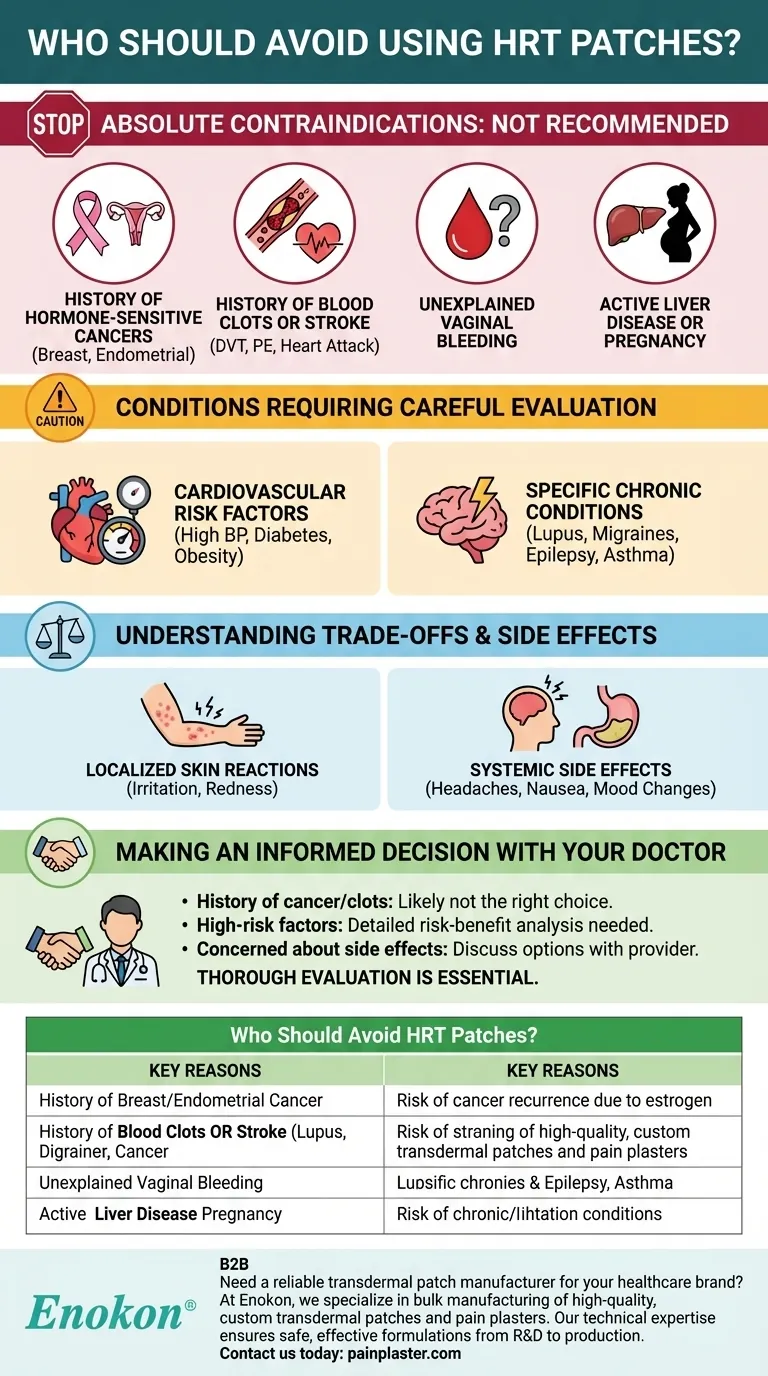Certain medical histories make HRT patches an unsuitable or high-risk option. Individuals with a personal history of specific cancers (like breast or endometrial), blood clots, or recent cardiovascular events are typically advised against using them. The decision also requires careful consideration for those with other pre-existing health conditions, as the hormones can introduce significant risks.
While HRT patches are an effective treatment for many, they are not universally safe. A thorough evaluation of your personal and family medical history with a healthcare provider is essential to determine if the benefits of symptom relief outweigh the potential risks.

Absolute Contraindications: When Patches Are Not Recommended
For some individuals, the risks associated with hormone replacement therapy are too high, making HRT patches a clear contraindication. These situations involve conditions that can be directly worsened by the introduction of estrogen and progestogen.
History of Hormone-Sensitive Cancers
If you have a personal history of breast cancer or endometrial cancer, HRT is generally not advised. These cancers are often fueled by estrogen, and adding more can increase the risk of recurrence.
History of Blood Clots or Stroke
A history of blood clots (venous thromboembolism) or a recent cardiovascular event like a heart attack or stroke is a major contraindication. Estrogen can increase the blood's tendency to clot, raising the risk of another serious event.
Unexplained Vaginal Bleeding
If you are experiencing unexplained vaginal bleeding, you should not start HRT. This symptom must be investigated by a doctor first to rule out underlying conditions like untreated endometrial hyperplasia or cancer.
Active Liver Disease or Pregnancy
The liver is responsible for processing hormones. If you have significant liver issues, your body may not handle the HRT patch correctly. HRT is also contraindicated during pregnancy or while breastfeeding.
Conditions Requiring Careful Evaluation
Beyond absolute contraindications, several health conditions require a careful risk-benefit analysis with your doctor. In these cases, HRT might still be an option, but it requires close monitoring and management.
Cardiovascular Risk Factors
Conditions like high blood pressure, diabetes, and obesity can increase your baseline risk for heart disease and stroke. Adding HRT requires a careful evaluation to ensure the benefits are worth the potential added cardiovascular strain.
Specific Chronic Conditions
Those with conditions like lupus, migraines with aura, epilepsy, or asthma need to have a detailed discussion with their provider. The hormones in HRT patches can sometimes interact with or exacerbate these underlying issues.
Understanding the Trade-offs and Side Effects
Even for suitable candidates, it's important to weigh the potential downsides. The decision to use HRT involves accepting certain trade-offs, from minor annoyances to more significant side effects.
Localized Skin Reactions
The patch adhesive can cause skin irritation, redness, or discoloration at the application site. While not medically dangerous, this can be a persistent issue for those with sensitive skin.
Systemic Side Effects
The hormones themselves can cause side effects. These may include headaches, nausea, breast tenderness, mood changes, and changes in weight or libido. For some, these effects are mild and temporary, but for others, they can be significant enough to discontinue use.
Making an Informed Decision with Your Doctor
Your unique health profile is the most important factor in determining if HRT patches are right for you. Use this information to guide a productive conversation with your healthcare provider.
- If you have a history of cancer, blood clots, or heart disease: HRT patches are likely not the right choice, and you should discuss non-hormonal menopause treatments with your doctor.
- If you have risk factors like high blood pressure or migraines: A detailed risk-benefit analysis with your provider is critical to determine if HRT can be used safely, often with closer monitoring.
- If you are concerned about side effects: Discuss your specific concerns, as your doctor may be able to suggest a different dosage, formulation, or delivery method to minimize them.
Ultimately, a collaborative and transparent conversation with your healthcare provider is the definitive step to ensuring your safety and well-being.
Summary Table:
| Who Should Avoid HRT Patches? | Key Reasons |
|---|---|
| History of Breast/Endometrial Cancer | Risk of cancer recurrence due to estrogen |
| History of Blood Clots/Stroke | Increased risk of clotting events |
| Unexplained Vaginal Bleeding | Must rule out underlying conditions first |
| Active Liver Disease | Liver may not process hormones correctly |
| High-Risk Cardiovascular Factors | Requires careful evaluation with a doctor |
Need a reliable transdermal patch manufacturer for your healthcare or pharma brand? At Enokon, we specialize in bulk manufacturing of high-quality, custom transdermal patches and pain plasters. Our technical expertise ensures safe, effective formulations tailored to your needs. Whether you require HRT patches or other medicated solutions, we provide end-to-end support from R&D to production. Contact us today to discuss your project and benefit from our trusted manufacturing capabilities.
Visual Guide

Related Products
- Far Infrared Heat Pain Relief Patches Transdermal Patches
- Heat Relief Capsicum Patch for Lower Back Pain Relief
- Heating Pain Relief Patches for Menstrual Cramps
- Far Infrared Knee Pain Patch Heat Patches for Pain Relief
- Far Infrared Deep Heat Relief Patches Medicated Pain Relief Patches
People Also Ask
- Can heat patches be used for fresh injuries? Avoid This Common Mistake for Faster Recovery
- Are heat patches safe for all body parts? Key Safety Zones and No-Go Areas Explained
- What are the common side effects of using the medicated heat patch? Understanding Risks & Safe Use
- How do Deep Heat Pain Relief Patches provide pain relief? Discover the Drug-Free Mechanism
- What types of pain can the Deep Heat Pain Relief Back Patch be used for? Targeted Relief for Muscles & Joints















